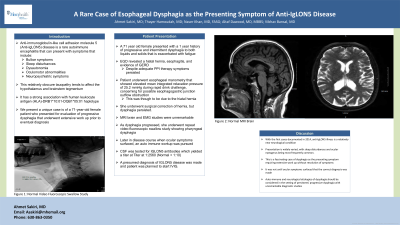Tuesday Poster Session
Category: Esophagus
P4002 - A Rare Case of Esophageal Dysphagia as the Presenting Symptom of Anti-IgLON5 Disease
Tuesday, October 29, 2024
10:30 AM - 4:00 PM ET
Location: Exhibit Hall E

Has Audio

Ahmet Sakiri, MD
Mercy Health
Rockford, IL
Presenting Author(s)
Ahmet Sakiri, MD, Thayer Hamoudah, MD, Naser Khan, MD, Altaf Dawood, MD, MBBS, Vibhav Bansal, MD
Mercy Health, Rockford, IL
Introduction: Anti-immunoglobulin-like cell adhesion molecule 5 (Anti-IgLON5) disease is a rare autoimmune encephalitis that can present with symptoms that include bulbar symptoms, sleep disturbances, dysautonomia, oculomotor abnormalities, and neuropsychiatric symptoms. This relatively obscure tauopathy tends to affect the hypothalamus and brainstem tegmentum and has a strong association with human leukocyte antigen (HLA)-DRB1*10:01-DQB1*05:01 haplotype, suggesting genetic susceptibility. We present a unique case is of a 71-year-old female patient who presented for evaluation of progressive an dysphagia that underwent extensive work up prior to eventual diagnosis.
Case Description/Methods: A 71 year old female presented with a 1 year history of progressive and intermittent dysphagia to both liquids and solids that is exacerbated with fatigue. She was seen by GI and they did an upper and lower endoscopy and noted hiatal hernia, esophagitis, and GERD. Despite adequate PPI therapy symptoms persisted. Patient underwent esophageal manometry that showed elevated mean integrated relaxation pressure of 25.2 mmHg during rapid drink challenge, concerning for possible esophagogastric junction outflow obstruction, possibly due to the hiatal hernia. She underwent surgical correction of hernia, but dysphagia persisted. MRI brain and EMG studies were unremarkable. Surgical referral was made and patient underwent hiatal hernia repair without symptom resolution. As dysphagia progressed, she underwent repeat video fluoroscopic swallow study showing pharyngeal dysphagia. Later in disease course when ocular symptoms surfaced, an auto immune workup was pursued. CSF was tested for IGLON5 antibodies which yielded a titer at Titer at 1:2560 (Normal < 1:10). A presumed diagnosis of IGLON5 disease was made and patient was planned to start IVIG.
Discussion: With the first cases documented in 2014, anti-IgLON5 illness is a relatively new neurological condition. Presentation is widely varied, with sleep disturbances and ocular nystagmus being most frequently common. This is a fascinating case of dysphagia as the presenting symptom requiring extensive work up without resolution of symptoms. It was not until ocular symptoms surfaced that the correct diagnosis was made.
Disclosures:
Ahmet Sakiri, MD, Thayer Hamoudah, MD, Naser Khan, MD, Altaf Dawood, MD, MBBS, Vibhav Bansal, MD. P4002 - A Rare Case of Esophageal Dysphagia as the Presenting Symptom of Anti-IgLON5 Disease, ACG 2024 Annual Scientific Meeting Abstracts. Philadelphia, PA: American College of Gastroenterology.
Mercy Health, Rockford, IL
Introduction: Anti-immunoglobulin-like cell adhesion molecule 5 (Anti-IgLON5) disease is a rare autoimmune encephalitis that can present with symptoms that include bulbar symptoms, sleep disturbances, dysautonomia, oculomotor abnormalities, and neuropsychiatric symptoms. This relatively obscure tauopathy tends to affect the hypothalamus and brainstem tegmentum and has a strong association with human leukocyte antigen (HLA)-DRB1*10:01-DQB1*05:01 haplotype, suggesting genetic susceptibility. We present a unique case is of a 71-year-old female patient who presented for evaluation of progressive an dysphagia that underwent extensive work up prior to eventual diagnosis.
Case Description/Methods: A 71 year old female presented with a 1 year history of progressive and intermittent dysphagia to both liquids and solids that is exacerbated with fatigue. She was seen by GI and they did an upper and lower endoscopy and noted hiatal hernia, esophagitis, and GERD. Despite adequate PPI therapy symptoms persisted. Patient underwent esophageal manometry that showed elevated mean integrated relaxation pressure of 25.2 mmHg during rapid drink challenge, concerning for possible esophagogastric junction outflow obstruction, possibly due to the hiatal hernia. She underwent surgical correction of hernia, but dysphagia persisted. MRI brain and EMG studies were unremarkable. Surgical referral was made and patient underwent hiatal hernia repair without symptom resolution. As dysphagia progressed, she underwent repeat video fluoroscopic swallow study showing pharyngeal dysphagia. Later in disease course when ocular symptoms surfaced, an auto immune workup was pursued. CSF was tested for IGLON5 antibodies which yielded a titer at Titer at 1:2560 (Normal < 1:10). A presumed diagnosis of IGLON5 disease was made and patient was planned to start IVIG.
Discussion: With the first cases documented in 2014, anti-IgLON5 illness is a relatively new neurological condition. Presentation is widely varied, with sleep disturbances and ocular nystagmus being most frequently common. This is a fascinating case of dysphagia as the presenting symptom requiring extensive work up without resolution of symptoms. It was not until ocular symptoms surfaced that the correct diagnosis was made.
Disclosures:
Ahmet Sakiri indicated no relevant financial relationships.
Thayer Hamoudah indicated no relevant financial relationships.
Naser Khan indicated no relevant financial relationships.
Altaf Dawood indicated no relevant financial relationships.
Vibhav Bansal indicated no relevant financial relationships.
Ahmet Sakiri, MD, Thayer Hamoudah, MD, Naser Khan, MD, Altaf Dawood, MD, MBBS, Vibhav Bansal, MD. P4002 - A Rare Case of Esophageal Dysphagia as the Presenting Symptom of Anti-IgLON5 Disease, ACG 2024 Annual Scientific Meeting Abstracts. Philadelphia, PA: American College of Gastroenterology.
